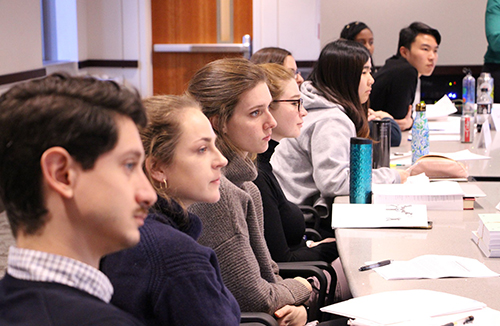LLM Curriculum
Duke Law’s LLM program provides the opportunity to learn the fundamentals of the U.S. legal system and choose from a wide range of courses that fit your career goals and meet your specific interests.
 Duke places special emphasis on building writing skills in English. In addition to a fall semester writing course, an un-graded elective course, the Legal Writing Workshop, is available to LLM students during the spring semester. The workshop is designed to provide additional instruction in U.S. legal correspondence and drafting, and to assist students in writing research papers and preparing for seminar presentations.
Duke places special emphasis on building writing skills in English. In addition to a fall semester writing course, an un-graded elective course, the Legal Writing Workshop, is available to LLM students during the spring semester. The workshop is designed to provide additional instruction in U.S. legal correspondence and drafting, and to assist students in writing research papers and preparing for seminar presentations.
Although the Duke Law LLM is not a research degree, students can produce a substantial research paper under faculty supervision either by conducting an independent research project or by enrolling in a seminar.
The law is an immensely broad field of study reflecting the many varied career paths that are available to lawyers. At Duke Law, you'll find a multitude of academic, extracurricular, and professional development opportunities that will enable you to focus deeply in the areas the most interest you.
- Constitutional Law and Civil Rights
- Corporate and Financial Law
- Criminal Law and Policy
- Environmental Law and Policy
- Health Law and Policy
- International Law and Human Rights
- Technology, Science, and Innovation
- Legal Theory and Critical Legal Studies
- Litigation and the Courts
Duke Law offers five certificate programs for LLM students to explore their research and career interests. Certificate programs are open to applicants with a minimum of two years’ practical experience in related fields.
 Every LLM student is assigned to a faculty member or administrator who serves as an advisor. Some students also serve as research assistants to faculty, helping with scholarship or course preparation. Faculty are eager to collaborate with and learn from their students, especially those who, like Duke international students, bring new perspectives and professional experience to their work.
Every LLM student is assigned to a faculty member or administrator who serves as an advisor. Some students also serve as research assistants to faculty, helping with scholarship or course preparation. Faculty are eager to collaborate with and learn from their students, especially those who, like Duke international students, bring new perspectives and professional experience to their work.
